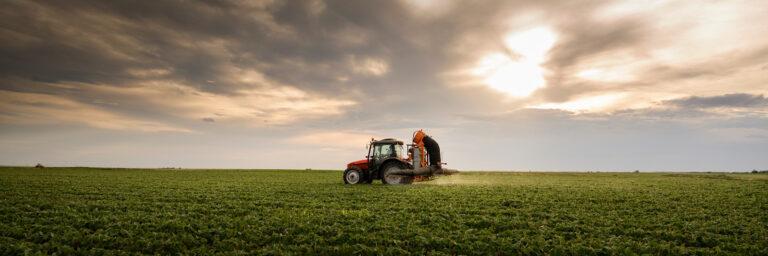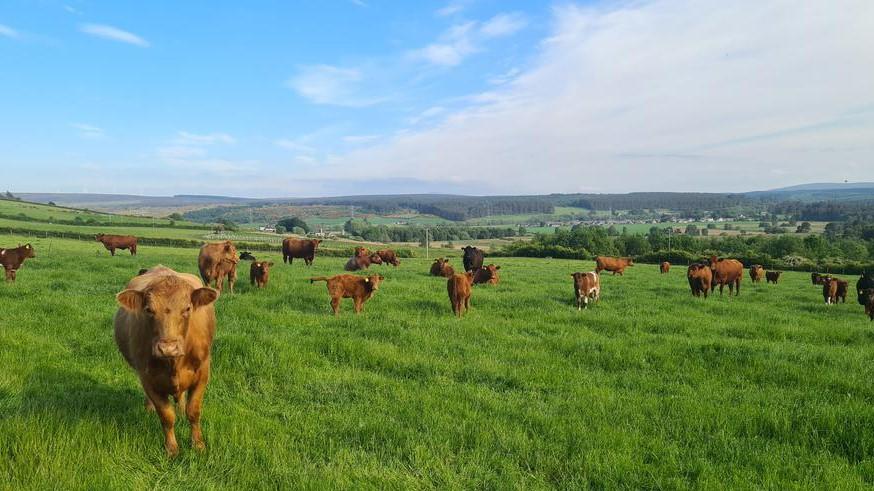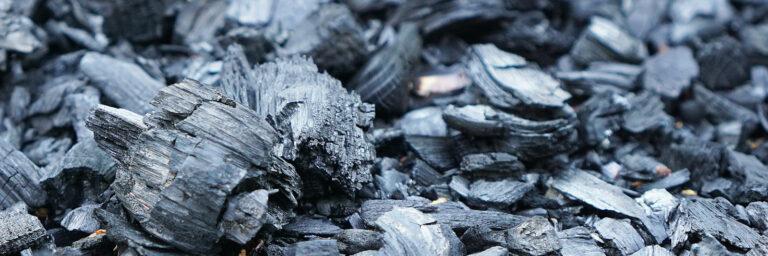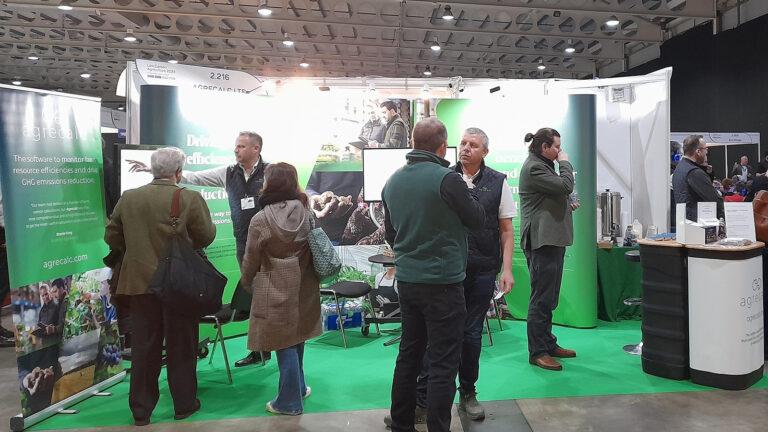
April Business Update: SRUC
After two years of operation as a Limited Company, Agrecalc became part of Scotland’s Rural College (SRUC) as of 1 April 2025.
Since 2017, Edinvale farm, an upland farm in Dallas, Morayshire, has committed to reaching carbon neutral beef farming, and although there’s a way to go to achieve this, the figures from the first three years show an overall reduction from 51 kg of CO2e per kilo of output down to 27 kg of CO2e per kilo of output.
This has put Edinvale farm strongly on a path of carbon reduction, through the cumulative effect of marrying practicalities of running a farm business and still doing the right thing from an environmental and biodiversity point of view.
Edinvale is a 100-acre farm housing a 270-strong mixture of Highland, Shorthorn and Aberdeen Angus cattle, all in the various stages of finishing for family-owned Macbeth’s Butchers, which supplies private individuals throughout the UK, as well as hotels and restaurants.
As a participant of Beef Efficiency scheme, Edinvale had started auditing annually via Agrecalc, chosen because it’s a recognised tool by the Scottish Government. In owner Jock Gibson’s words, the Scheme has been pivotal in empowering the business to look at mitigation options available for reducing emissions and improving profitability, and auditing with Agrecalc has provided an invaluable insight into the business operation from both a carbon point of view as well as productivity.
One of the biggest reductions in the farm’s carbon emissions was 28% reduction in direct CO2 from fuel use and machinery. This has led to increased cost savings, as through Agrecalc, mitigation measures such as keeping a careful eye on diesel use were introduced.
Recording where the fuel was going, and then inputting those figures into the software, identified equipment that was reaching the end of its efficiency and needed to be replaced, as well as enabled diesel use in other areas of the farm where it was needed, instead of wasted.

"We’re now producing relatively carbon efficient beef – per kilo of output, our emissions are down from 51kg of CO2 to 27kg."
Jock Gibson, Edinvale farm owner
With a bit of experimenting, Jock has discovered that the soil on his farm needs a slightly different pH for optimum efficiency.
“We have long been told that we have to keep our soils at a pH of 5.8, and the reality is that it probably needs to be nearer 6.2 to keep our soils healthy. Being able to drill down with Agrecalc, into some figures that are coming from a carbon audit, like using too much fertiliser, or using it inefficiently, or a negative impact on emissions from soil due to using lime, has got us into researching into different fertilisers, and a more effective and efficient usage of that fertiliser. We’re hoping that, by using less or no fertiliser, we won’t have an acidifying effect which in turn will reduce our dependency on lime, and it will be better for biodiversity.”
This course of action has further pushed the business towards carbon neutral beef farming, resulting in a 37% reduction in nitrous oxide (N2O) emissions.
Although the methane (CH4) emissions reported were generally higher than expected, this was due to an increase in the number of cattle, which is forecast to go down in the next audit, because a planned reduction in numbers is on the cards. The business has already decreased its carbon footprint by a third of what it was when they started auditing.
Also, because Edinvale specialises in Highland cattle, which is relatively slow to mature, the cows are on the pastures for longer, but they are finished on grass and forage only. This is one of the things that ‘have to be taken on the chin’ as Jock puts it, when you want to produce beef in this way.
The farm is continually looking into mitigation measures that can be applied in order to reduce methane emissions. For the moment, those numbers are oscillating, but they are expected to stabilise in the long term.
As Agrecalc gives the overall farm emissions numbers, as well as per enterprise and per kilo of output, Edinvale’s results for year 2021 were up 11% of CO2 emissions overall. However, the audit has not included trees planted on farm, which will be one of the tasks for this year.
“There is still a lot of scope to reduce emissions further. Every year is slightly different, and you have to look at those metrics as a rolling average. The point is to identify areas for progress. We’re now producing relatively carbon efficient beef – per kilo of output, our emissions are down from 51kg of CO2 to 27kg. As we’ll be putting a lot of cattle through our butcher shop this autumn and winter, the output will be up, and the audit should look really good from the carbon emissions per kilo basis.”
Edinvale Farm has implemented a lot of sequestration measures as well, with minimising ploughing, planting more trees – about 2 hectares – coming close to 10% of the farm comprising of trees, and planting more hedges – around 1 kilometre on a 100-acre farm. As a Pasture for Life- accredited farm, the business is also employing rotational grazing, has clover-rich grazing platforms, and is keeping grass leys in for longer.
“We’re looking forward to improvements in the Agrecalc tool, which will make it possible for us to include biodiversity, peatland, possibly sequestration per hectare as a metric. We always come back to – what gets measured, gets achieved, and with Agrecalc, we’re doing just that”, concludes Edinvale Farm owner Jock Gibson.

After two years of operation as a Limited Company, Agrecalc became part of Scotland’s Rural College (SRUC) as of 1 April 2025.

Biochar is a carbon-rich material produced by pyrolysing biomass, which offers a variety of potential agronomic benefits. In this guest article, Black Bull Biochar discusses how these effects work together to bolster productivity, sustainability, and resilience in farming.

The Agrecalc team is looking forward to welcoming you at our stand (2.844) at this year’s Low Carbon Agriculture Show, taking place on March 5 and 6, at NAEC Stoneleigh near Kenilworth.